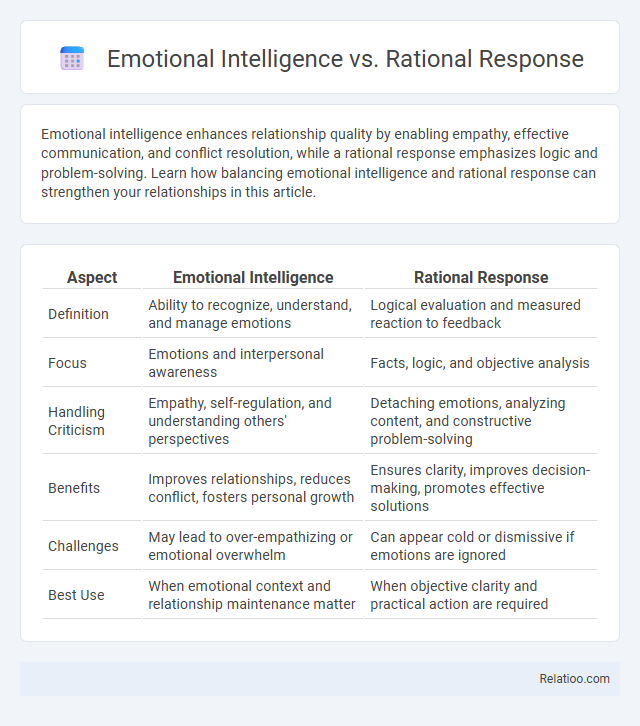Emotional intelligence enhances relationship quality by enabling empathy, effective communication, and conflict resolution, while a rational response emphasizes logic and problem-solving. Learn how balancing emotional intelligence and rational response can strengthen your relationships in this article.
Table of Comparison
| Aspect | Emotional Intelligence | Rational Response |
|---|---|---|
| Definition | Ability to recognize, understand, and manage emotions | Logical evaluation and measured reaction to feedback |
| Focus | Emotions and interpersonal awareness | Facts, logic, and objective analysis |
| Handling Criticism | Empathy, self-regulation, and understanding others' perspectives | Detaching emotions, analyzing content, and constructive problem-solving |
| Benefits | Improves relationships, reduces conflict, fosters personal growth | Ensures clarity, improves decision-making, promotes effective solutions |
| Challenges | May lead to over-empathizing or emotional overwhelm | Can appear cold or dismissive if emotions are ignored |
| Best Use | When emotional context and relationship maintenance matter | When objective clarity and practical action are required |
Understanding Emotional Intelligence
Emotional intelligence involves recognizing, understanding, and managing both your own emotions and those of others, enhancing interpersonal communication and decision-making. Unlike purely rational responses that rely on logic and analytical thinking, emotional intelligence integrates empathy and self-awareness to navigate complex social interactions effectively. Listening fatigue occurs when continuous emotional and cognitive engagement drains mental resources, highlighting the need for balanced emotional regulation to maintain attentive and meaningful communication.
Defining Rational Response
A rational response involves analyzing situations objectively, using logic and evidence to guide decisions instead of emotions. This approach contrasts with emotional intelligence, which emphasizes recognizing and managing feelings for effective communication. Understanding your rational response helps balance emotion-driven reactions and reduces the impact of listening fatigue during prolonged conversations or information overload.
Key Differences Between Emotional Intelligence and Rational Response
Emotional intelligence involves recognizing, understanding, and managing one's own emotions and those of others, facilitating empathetic and adaptive interactions. Rational response prioritizes logical analysis and objective reasoning, focusing on problem-solving without the influence of emotional bias. Listening fatigue occurs when continuous emotional or cognitive engagement overwhelms an individual, decreasing the capacity to effectively process information or respond empathetically.
The Role of Emotions in Decision-Making
Emotional intelligence plays a crucial role in decision-making by enabling individuals to recognize, understand, and manage their emotions, leading to more balanced and empathetic choices. Overreliance on rational response alone can neglect vital emotional cues, potentially causing decision fatigue or listening fatigue, where processing complex emotional information becomes overwhelming. Integrating emotional awareness with logical analysis enhances cognitive flexibility and improves outcomes in high-stress or nuanced environments.
The Importance of Logic in Problem Solving
Emphasizing logic in problem solving enhances clarity and accuracy by prioritizing evidence-based analysis over emotional influence and listening fatigue. Rational responses enable objective evaluation of complex situations, reducing biases introduced by emotional intelligence which, although valuable for empathy, can sometimes cloud judgment. Overcoming listening fatigue is crucial to maintain focus and process information effectively, ensuring logical reasoning drives sound decisions.
Benefits of Emotional Intelligence in Relationships
Emotional intelligence enhances relationships by enabling individuals to recognize, understand, and manage their own emotions as well as empathize with others, fostering deeper connection and trust. Unlike purely rational responses that may overlook emotional nuance, emotional intelligence promotes compassionate communication and conflict resolution. This skill also mitigates listening fatigue by encouraging active engagement and emotional attunement, improving overall interpersonal dynamics.
Rational Response Advantages in Critical Situations
Rational response in critical situations enhances decision-making by minimizing emotional bias and promoting clear, logical thinking, which leads to more effective problem-solving under pressure. Emotional intelligence aids in understanding others' perspectives and managing emotions, but relying on a rational approach ensures consistency and objectivity when quick, sound judgments are essential. Listening fatigue can impair information processing, so prioritizing rational responses helps maintain focus and accuracy during high-stakes scenarios.
Balancing Emotions and Logic for Optimal Outcomes
Balancing emotional intelligence and rational response is crucial for optimal decision-making, as emotional awareness enhances empathy while logical analysis ensures objective problem-solving. Listening fatigue occurs when cognitive overload impairs the ability to process information effectively, highlighting the need to manage emotional engagement and mental stamina. Integrating emotional regulation with clear, rational thinking fosters resilience, improves communication, and supports sustainable productivity.
Common Misconceptions About Emotional Intelligence and Rationality
Common misconceptions about emotional intelligence (EI) often confuse it with merely controlling emotions or suppressing feelings in favor of rational responses, overlooking that EI involves recognizing, understanding, and managing emotions effectively. Rationality is frequently perceived as purely logic-driven decision-making, but integrating emotional insights enhances problem-solving and social interactions rather than diminishing objective reasoning. Listening fatigue, resulting from prolonged cognitive and emotional engagement, can impair both emotional intelligence and rational responses by reducing focus and empathy during communication.
Strategies to Enhance Both Emotional Intelligence and Rational Thinking
Developing emotional intelligence and rational thinking involves practicing mindfulness techniques to increase self-awareness and regulate emotions effectively, which reduces listening fatigue during interactions. Implementing active listening strategies such as summarizing, questioning, and reflecting ensures deeper comprehension and balanced responses, fostering cognitive clarity and emotional resilience. Structured decision-making frameworks like pros-and-cons analysis combined with empathy exercises enhance the ability to respond thoughtfully and sustainably in high-stress communication scenarios.

Infographic: Emotional Intelligence vs Rational Response
 relatioo.com
relatioo.com